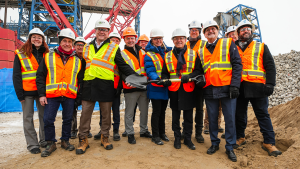MONTREAl, QC. – Five Quebec municipalities located by a proposed site for a graphite mine with ties to the Pentagon have created an alliance to accelerate public consultations on the project and pressure the provincial government to listen to what locals have to say.
When Lomiko Metals Inc., a mining company based in Surrey, B.C., announced plans for a mine in Quebec’s Laurentians region to produce graphite — one of the world’s most sought after critical minerals needed for manufacturing electric vehicle batteries — some residents living nearby began protesting the project, fearing the potential harm to the environment.
They got even more upset when they learned that Lomiko received $11.4 million from the United States Department of Defence for the project.
Since then, municipalities near the proposed mine site — Duhamel, Lac-Simon, Chénéville, St-Émile-de-Suffolk and Lac-des-Plages — have decided to take charge of informing the public.
Usually companies that want to build major projects have the responsibility to hold public consultations and ensure a level of “social acceptability,” says Duhamel Mayor David Pharand, spokesperson of the alliance.
But not this time. Pharand said the alliance wants to hold consultations over the next few months and then, by 2026, launch a type of vote, possibly a referendum, to find out exactly what people think of the project. However, Pharand says, the provincial government must agree that a referendum or other type of process to gather public opinion is a legitimate way to reflect the project’s social acceptability.
Rodrigue Turgeon, national program co-lead at Mining Watch Canada, says the level of engagement from the communities so early in the process is “unusual” in the country, calling it a “true example to be followed by other municipalities.”
Turgeon, who also practices environmental and mining law, says a referendum would be “unprecedented” for Quebec, though common in Latin America.
Louis Saint-Hilaire, president of a local environmental group, will attend the first public information session on July 21 as one of the speakers opposing the mine.
“We don’t want to have a gigantic open pit mine in the middle of all those lakes and all those people living around them,” he said, insisting that few locals support the project, especially after Lomiko announced in May it received a grant of $11.4 million from the Pentagon.
“People are furious about this,” he said.
The Pentagon has said Lomiko’s graphite will bolster North American energy supply chains and be used for “defence applications.”
Lomiko has said it will be conducting feasibility and metallurgical studies over the next five years and will be subject to a review by Quebec’s environment consultations office, known as the BAPE. It says it plans to begin construction by 2027.
Graphite is a key mineral for manufacturing military equipment. A 2023 report by The Hague Centre for Strategic Studies, a defence and security think tank based in the Netherlands, lists graphite as a critical mineral whose supply chain is under threat. The report said European militaries need graphite for fighter aircraft, battle tanks, submarines, artillery and ammunition.
In a statement, Lomiko chief sustainability officer Cindy Valence told The Canadian Press that the company has already met with “a multitude of stakeholders” and will “follow all government processes as a responsible operator in the critical minerals sector.”
The company will continue to share the results of water quality testing with the community and seek local feedback on other issues including road access, according to Valence, who added that the mine will create jobs and help Quebec meet its critical minerals strategy objectives.
The office of Quebec Minister of Natural Resources Maïté Blanchette Vézina said, “it is important that the mining projects that go forward in Quebec generate social acceptability in the communities concerned.”
In a separate statement, the Natural Resources Department said it requires companies seeking mining leases to receive authorization under Quebec’s Environment Quality Act, a process that generally involves consulting the BAPE. “To ensure that a mining project integrates into its host environment, developers are strongly encouraged to set up mechanisms for dialogue with communities very early on in the development of their project,” the department said.
However, Turgeon says it can take years for the BAPE to make an impact assessment, long after mining companies have begun promising jobs and centering the debate on economic development at the expense of environmental considerations.
Furthermore, what defines social acceptability remains murky. “There are no specific guidelines in the (Quebec) Mining Act, nor in any other laws in Quebec at the moment to define social acceptability,” said Turgeon.
©2024 THE CANADIAN PRESS








Recent Comments
comments for this post are closed